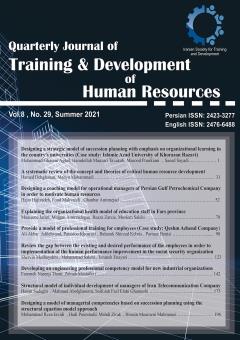Explaining the organizational health model of education staff in Fars province
Subject Areas :Maasume Jaafari 1 , Mojgan Amirianzadeh 2 , reza zarei 3 , moslem Salehi 4
1 - Azad
2 - Azad
3 - Tajikestan
4 - Tehran University
Keywords: Organizational health model education staff data foundation,
Abstract :
The aim of this study was to provide an organizational health model in education staff in Fars province. The present study is qualitative and data based. The statistical population of the present study consists of experts and managers of the Education Organization of Fars Province. Purposeful sampling method (desirable cases) was used to interview experts in the field of Farhangian University. In this regard, purposeful theoretical saturation was obtained in the data by in-depth interviews with 14 people. These participants had valuable information on the subject of research and often held managerial and planning positions in the field. Findings showed that the organizational health model of education staff in Fars province and its components are developed in the form of six paradigms of central phenomenon, contextual conditions, causal conditions, intervening conditions, strategies and consequences. In this model, the relationships between components indicate that the organizational health model is performed during a process of interaction between components.
شتراوس، انسلیم؛ و کوربین، جولیت( 1395). مبانی پژوهش کیفی: فنون و مراحل تولید نظریه زمینه¬ای، ترجمه ابراهیم افشار، چاپ پنجم، تهران: نشر نی، صص 69-23.
ترکزاده, جعفر, بصیری, سعیده, عقیلی, رضا (1396). مدلسازی سلامت سازمانی( مورد مطالعه: سازمان آموزش فنی و حرفه ای استان فارس، خطمشیگذاری عمومی در مدیریت8(4)، 45-63.
داد سپاهی, کریم؛ پورشافعی، هادی؛عسگری،علی و سالاری نژاد، رحیمه. (1394). نقش پیش بینی کننده سلامت سازمانی در مشارکت پذیری کارکنان مورد مطالعه: سازمان آموزش و پرورش شهر بیرجند. مطالعات فرهنگی اجتماعی خراسان, 10(1), 71-92.
رحیمیان، حمید؛ عباس پور، عباس؛ مهرگان، محمدرضا؛ و هدایتی، فرشته( 1396). اعتباريابي کيفي مدل مفهومي مدرسه سالم با تاکيد بر سلامت سازماني، فصلنامه علمي–پژوهشي رهيافتي نودرمديريت آموزشي، 8(2): 30-1.
زمانيان، محمد( 1379 ).. رابطه بين سلامت سازماني مدرسه و الگوهاي رفتار سازماني، پايان نامه كارشناسي ارشد، دانشگاه علامه طباطبايي تهران. تهران.
صافی، ا. (1398). صد سال تربیت معلم در ایران: فرصتها، تهدیدها و چشم انداز آینده. مجله تعلیم و تربیت، جلد 35، شماره 2، 106 -83.
فتحی واجارگاه ، کورش ؛ کشاورز ، سوسن ؛ تاجیک اسمعیلی ، عزیزالله ؛ خسروی، علی اکبر ؛ دیبا واجاری، طلعت ؛ پور صادقی، حبیب اله ؛ رحمتی، مریم ؛ و زندیه، گیتا( 1392). مدرسه زندگی باید در پی تربیت کدام شهروند مطلوب باشد؟ دوفصلنامه مديريت وبرنامه ريزي درنظامهاي آموزشی، 6(11): 44-9.
علاقه بند علي( 1378 ) . سلامت سازماني در مدرسه ، فصلنامه مديريت در آموزش و پرورش ، دوره ششم.
کولایی، قدرت اله ؛ زاهد بابلان، عادل ؛ معینی کیا ، مهدی ؛ رضایی شریف، علی( 1398). مدلسازی رهبری مدیران مدارس بر اشتیاق شغلی معلمان به واسطه فرهنگ مدرسه، توانمندسازی و ویژگیهای شغلی، دوفصلنامه مديريت وبرنامه ريزي درنظامهاي آموزشی، 12(1): 238-213.
یاسینی، علی ؛ ایدی،فاطمه و آقایی، هادی (1397). شناسایی مؤلفههای فرهنگ دینی مؤثر بر ارتقای سلامت سازمانی در نظام آموزش عالی ایران، فصلنامه مدیریت اسلامی، 26(1)،60-39
Chae, C., Suh, B., Han, S., Han, H., and Lim, DH . (2018). Enhancing learner-driven informal learning in a virtual practice community: The Massive Open Online Course (MOOC) as a learning solution for professional development, Handbook of research on digital content, mobile learning, and technology Integration Models in Teacher Education, University of North Dakota, USA
Chaudhari, A. P. (2019). Challenges of Human Resource Management in HEIs, Conference: NCRTMCSA 2019. At: Jalgaon, India.
Chijioke, M. E., Nwannunu, B. I., & Owan, V. J. (2019). Principals’ Supervisory Techniques for Combating Corruption and the Attainment of Quality School Governance in Public Secondary Schools in Aba Education Zone of Abia State,
Schuyler, K.G.( 2014). The possibility of healthy organizations: toward a newframework for organizational theory and practice. Journal of Applied Sociology, 21 (2), pp 57–79.
Evans, A; & Chun, E. B. (2019). Are the walls really down? Behavioral and organizational harriers to faculty and staff diversity. ASHE Higher Education Report, 33 (1).
Karlsson, M., Garvare, R., Zingmark, K., & Nordström, B. (2019). Organizing for sustainable inter-organizational collaboration in health care processes. Journal of interprofessional care, 1-10.
Farmanova, E., Bonneville, L., & Bouchard, L. (2018). Organizational health literacy: review of theories, frameworks, guides, and implementation issues. INQUIRY: The Journal of Health Care Organization, Provision, and Financing, 55, 0046958018757848
Menon, S. (2015). HRM in higher education: the need of the hour. IOSR Journal of Research & Method in Education, 5(6), 12-14.
Nestorowicz, N., & Park, J. H. (2020). Human Resource Development in Higher Education, http://donau.booktype.pro/human-resource-management-in-higher-education/human-resource-development-in-higher-education/
Sartor, M. A., & Beamish, P. W. (2019). Private Sector Corruption, Public Sector Corruption and the Organizational Structure of Foreign Subsidiaries. Journal of Business Ethics, 1-20.


